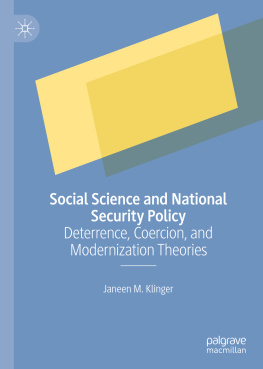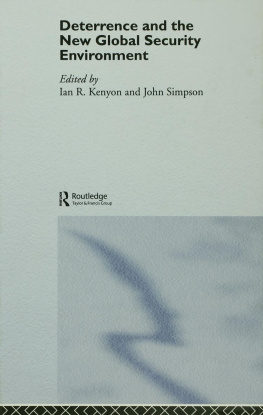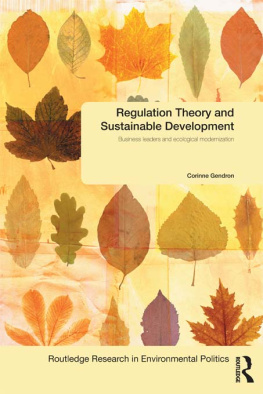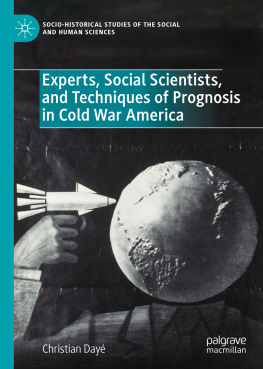Contents
Landmarks
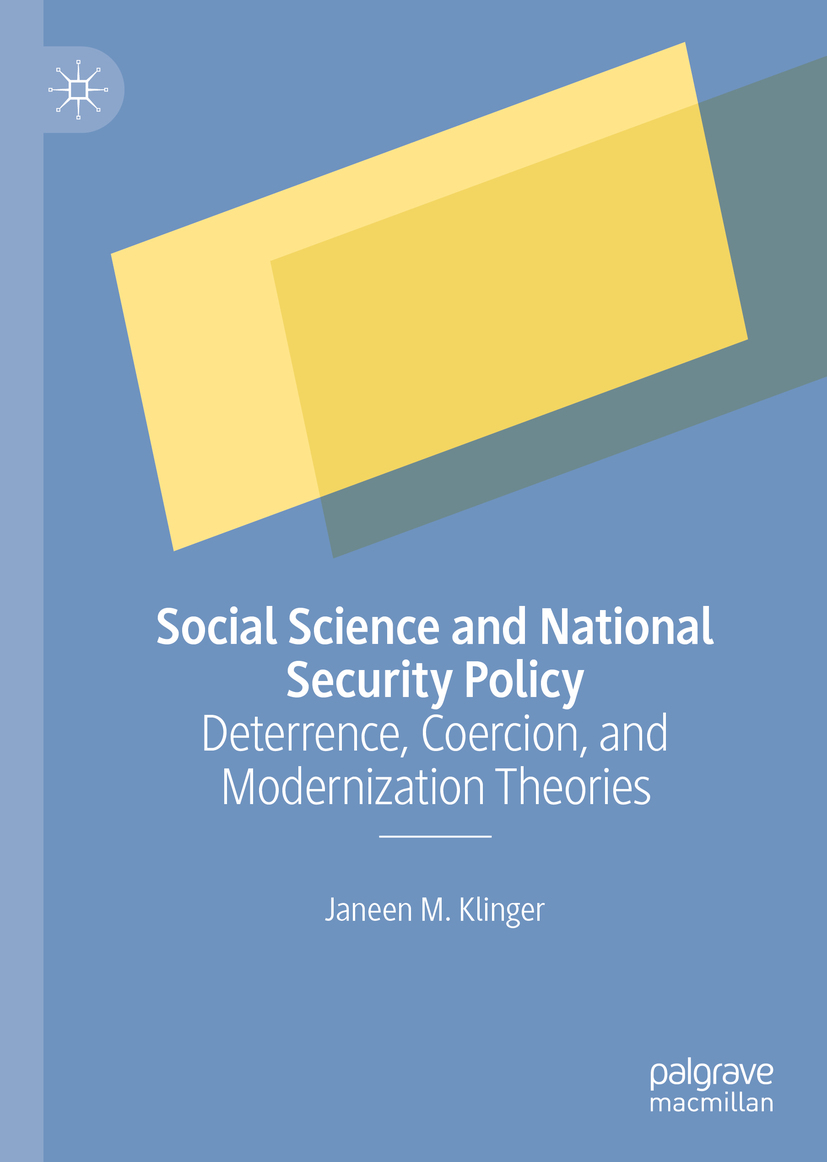
Janeen M. Klinger
Social Science and National Security Policy Deterrence, Coercion, and Modernization Theories
Janeen M. Klinger
US Army War College, Carlisle, PA, USA
ISBN 978-3-030-11250-9 e-ISBN 978-3-030-11251-6
https://doi.org/10.1007/978-3-030-11251-6
Library of Congress Control Number: 2018968358
The Editor(s) (if applicable) and The Author(s) 2019
This work is subject to copyright. All rights are solely and exclusively licensed by the Publisher, whether the whole or part of the material is concerned, specifically the rights of translation, reprinting, reuse of illustrations, recitation, broadcasting, reproduction on microfilms or in any other physical way, and transmission or information storage and retrieval, electronic adaptation, computer software, or by similar or dissimilar methodology now known or hereafter developed.
The use of general descriptive names, registered names, trademarks, service marks, etc. in this publication does not imply, even in the absence of a specific statement, that such names are exempt from the relevant protective laws and regulations and therefore free for general use.
The publisher, the authors and the editors are safe to assume that the advice and information in this book are believed to be true and accurate at the date of publication. Neither the publisher nor the authors or the editors give a warranty, express or implied, with respect to the material contained herein or for any errors or omissions that may have been made. The publisher remains neutral with regard to jurisdictional claims in published maps and institutional affiliations.
This Palgrave Macmillan imprint is published by the registered company Springer Nature Switzerland AG
The registered company address is: Gewerbestrasse 11, 6330 Cham, Switzerland
For the generation that came of age during the Vietnam War
Acknowledgments
I owe an intellectual debt to so many scholars and colleagues that it is impossible to list them all. However, I would be remiss if I did not recognize the role of some key individuals. I thank the US Army War College for the sabbatical year that allowed me to initiate this project. I also thank my good colleague Frank Jones for his substantive insights and his editorial suggestions. Thanks also goes to the chair of the Department of National Security and Strategy, Mark Duckenfield, for his support. For some sound editorial advice, I thank Walter McDougall and Karen Rood. Finally, I thank my mentor, the late Paul Seabury, for inspiring my interest in American National Security Policy. It goes without saying that any shortcomings in this book are all my own.
Contents
The Author(s) 2019
Janeen M. Klinger Social Science and National Security Policy https://doi.org/10.1007/978-3-030-11251-6_1
1. Evolution of a Partnership: Social Science and National Security Policy
Janeen M. Klinger
(1)
US Army War College, Carlisle, PA, USA
Numerous contemporary commentators have observed that there is a gap that might accurately be described as an estrangement between academic social scientists and policy-makersespecially those charged with national security policy. Indeed, some scholars have asserted that the gap between the two worlds is growing wider. Yet, for a variety of reasons, including the changes in the strategic environment after World War II, the influence of social scientists on national security policy grew, and the early Cold War has been characterized as the heyday for such an influence.
The problematic nature of the close relationship between social science and policy-makers is well demonstrated through an examination of two social science frameworks that came to be reflected in national security policy in that era. The two conceptual frameworks that will be discussed in detail in subsequent chapters are deterrence/coercion theory and modernization theory. Both frameworks, as we shall see, can be implicated in the strategy that the United States used in its prosecution of the war in Vietnam. At the same time that the story of the incorporation of deterrence and modernization theory into policy provides a warning to policy-makers, it should stand as a sobering reminder to scholars of the limits to their theory and the potential hazards to the discipline of abandoning older approaches and terminology in the interest of scholarly innovation.
But before we can describe the aspect of each framework and their respective association to policy, we need to provide some background concerning the evolution of ties between social scientists and policy-makers to show how both groups would, for their own reasons, become attracted to a scientific approach for a US grand strategy. While this book includes a variety of disciplines under the general category of social science, we do recognize a difference among the disciplines in terms of their receptivity to the generalizing potential of science. We can therefore distinguish between anthropology and history with their greater tendency to contextualize their analysis in specific circumstances and the more universalizing discipline of economics. Perhaps political science and sociology might be viewed appropriately as splitting the difference and containing research strands reflecting each tendency, and therefore were more prone to reflect what I have labeled a conflicted identity.
To begin with, the development of any ties between social scientists and policy-makers needed to overcome the fact that each group inhabited different professional environments requiring different organizational cultures to perform their respective tasks. Academic social scientists tend to pursue knowledge for its own sake to enhance their disciplines. Such analytical work means abstraction is a virtue that may require long time horizons to complete. Moreover, because collaboration is not required, research can easily be conducted within a horizontal organizational structure. In addition, the task of furthering disciplinary knowledge demands specialization that often results in jargon-laden analysis that can, at times, remain unintelligible to outsiders. Indeed, so acute is the communication problem that one scholar writing in the 1960s, those halcyon days of collaboration between social scientists and policy-makers, observed that the social sciences have come to make almost a fetish of non-communication.
For their part, the tasks of policy-makers provide a stark contrast to that of the social scientists. Concrete practical problems are frequently time-sensitive requiring action that must reconcile competing interests, thereby sacrificing the best solution for one that is feasible. In such cases, as Carol Weiss expressed the point, Political rationality may eclipse scientific rationality.
That the specialized nature of academic social science would necessarily provide knowledge that was remote from the needs of policy-makers was even recognized by men who straddled the policy and academic divide in the 1960s when social science enjoyed its greatest influence on policy. For example, McGeorge Bundy expressed criticism of scholarship that was not useful for statesmanship or diplomacy and suggested that there was perhaps too much, analysis aimed at scholarly rigor and scientific validity.

